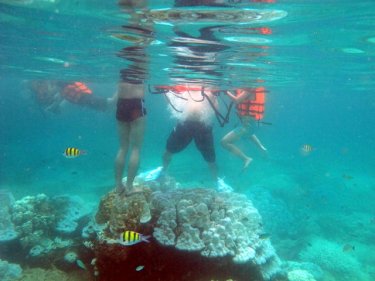THAT'S the Phuket diving industry's Dance of Death being performed above, on a coral reef off Phi Phi.
Dr Nalinee Thongtham, a marine biologist at the Phuket Marine Biology Centre, took the photograph on a reef near Phi Phi earlier this month. The tourists were feeding fish with bread, and killing the reef at the same time.
Many of the issues assailing the Phuket region's dive industry are to be raised on Tuesday when Thailand's marine biologists gather in Bangkok. It is an important meeting.
If the alarm among marine biologists on Phuket is reflected in other diving centres around Thailand, a sense of crisis is likely to drive dramatic changes. The meeting comes just a week after the Tourism Authority of Thailand Governor Suraphon Svetasreni announced the following:
"We recognise that there is no other option but to work towards a green standard, as this is what the modern consumer and well-informed world traveller wants. Green is the new norm.
''Promoting a healthy respect for the environment and the careful management and utilisation of limited resources is essential if Thailand is to ensure a bright and promising future for her people."
And here, in the photograph above, we have tourists standing on Thailand tourism's future, killing Thailand's ''bright and promising green future.''
For Thailand's new, nature-sensitive paradigm to work, the degree of current damage has to first be recognised. And the marine biologists from Phuket and in other parts of the country are in the frontline of recognition.
On Tuesday, they will have their say.
What Dr Nalinee saw on Phi Phi on a two-day trip earlier this month confirms the belief that it's time for greater control over the the two greatest threats to the region's coral reef treasures: the fishing industry and diving, including day-trip tourism.
Marine biologists recognise that law enforcement is the big problem. If they had their way, there would be no sightings of trawlers in marine national parks that did not lead to arrests and punishment.
That's what their message is likely to be to the national government and tourism authorities on Tuesday.
And while there are many in the diving industry who maintain a proper respect for the marine environment, there are also many who do not. Uncontrolled, mass tourism will kill the reefs, from greed.
It's time for action.
Why? Because there are other dangers over which the marine biologists and the diving industry have no control. The utmost care is required to preserve the underwater beauty of the Andaman and Phang Nga Bay.
The natural damage inflicted this year by a burst of coral bleaching is not unprecedented. But for the first time, it does come at a time when the combination of threats to the coral reefs of Thailand have never been more intense.
Phuketwan has visited sites in the region that would have once been among the most beautiful diving spots in the world. Now they are overrun - or over speedboated - by tourism at its worst.
Dr Nalinee's diagramatic maps of Phi Phi are even more alarming than her photographs. They show Phi Phi Don almost entirely ringed by red and yellow: the red for dead coral, the yellow for badly damaged coral.
The effects of a season of exceptional coral bleaching are reversible, provided they are not followed quickly by more bleachings.
The damage from mass tourism is not reversible, because the tourists will keep coming. Allow tourists to continue to walk all over the reefs, and the entire industry will be trampled to death.
It's time for action.
Photo Galore Phuket revved up and rejoiced at its first motor racing event over the weekend, drawing tens of thousands despite being ignored entirely by segments of the island's media.
Phuket Loves Motor Racing: Photo Special
Patong Bars Stung by 'Send the Fare' Scammer
Latest World wise Patong bar owners have been stung by a scam in which they paid the fares for a brace of bar workers from Bangkok. And a crackdown brings two arrests over fireworks.
Patong Bars Stung by 'Send the Fare' Scammer
Phuket Oil Hunt Goes On After Damaging Spill
Latest Environmental concerns are likely to be raised if a search for oil off Phuket proves successful. The Thai explorers have been criticised for a spill off Australia and Indonesia.
Phuket Oil Hunt Goes On After Damaging Spill
Italian Doubles Phuket Tri Titles in Quick Time
Latest Swimming, riding and running, an Italian who was thought to be out of contention proves the doubters wrong to take the 2010 Laguna Phuket Triathlon title. Now for the Ironman 70.3.
Italian Doubles Phuket Tri Titles in Quick Time
FC Phuket Wins 2-0: Camara May Quit Hospital
Photo Album A two nil victory sees FC Phuket move up to second place in Group B with three matches to play. Stricken midfielder Camara Ahmed is progressing and may soon leave hospital.
FC Phuket Wins 2-0: Camara May Quit Hospital





Everything in this article is true, I take speedboats snorkeling to Phi Phi 4 or 5 days a week and I see this constantly. But its the Tour guides who cause the most damage. Just yesterday I yelled at tourists to stop standing on the coral, they said it was ok because "their guide said it was dead". Then, the guide continued to encourage them to stand on the coral while he took photos of them. Blame the Thai guides - not the tourists.
Posted by sailorgirl on November 28, 2010 18:52